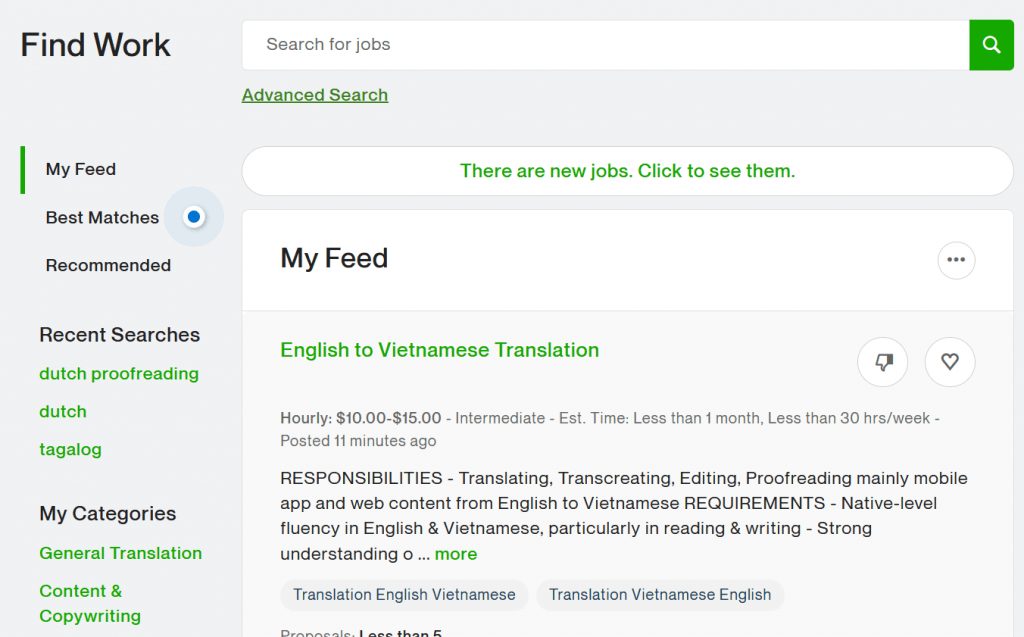How to start freelancing?
Freelancing is one of the best ways to get started with a location independent income.
Everyone can do this, usually from wherever you want in the world.
There are plenty of options, and you can generally make quite a bit of money – within limits.
If you have some sort of marketable skill, you can typically get going within a few hours, and often make money the very same day.
I’ll explain what freelancing is , what options you have, how you can get started, and why you should consider it.
What is freelancing?
Freelancing comes down to independently carrying out assignments for customers.
You don’t have to have a company for this, you are just an “expert” in a certain field and complete tasks for people who pay you for it.
Such a relationship is non-binding in the long term, it is only valid for that particular assignment.
As soon as the assignment is completed according to the terms agreed to, you will be paid (unless you have been paid already), and that’s it.
After this, you no longer owe the client anything.
This gives you tremendous freedom and the lack of a continuous “boss” is hugely uplifting and liberating.
Honestly, if you’ve always worked for someone else, I cannot express strongly enough how much I would recommend you to get rid of those shackles.
In most cases, freelancers are free to determine where and when they perform an assignment.
There are, of course, scenarios where you have to go on site with a client for this or that, but that depends a lot on your niche – and I would advise you to choose a niche where you have complete freedom concerning the time and place you work, allowing you the option to physically escape the West and move to, say, Thailand or Paraguay.
Potential sectors
You can become a freelancer in more or less any industry you can think of.
The most common options are professions such as writer, graphic designer, translator, and so on.
These provide services that companies could use from time to time, but not necessarily want to permanently hire someone for.
(Can’t blame them, having employees comes with so many downsides, especially in the over-sensitive, over-taxed and over-regulated Western world!)
Let’s say you want to get started and earn your money as a freelance translator.
- Firstly, you search for, or receive an assignment from a company or private individual to translate this or that.
- Then you agree on a price (either per word or per hour or per entire assignment) and a specific deadline.
- You work on that assignment until it’s done, submit it, get your pay, and it’s over.
If the client is satisfied with your work, you can negotiate a new assignment.
If not, ehh …
Stay professional and do everything you can to make your client happy, but if you’ve done a good job to the best of your knowledge and skills and the client doesn’t act reasonable or expects something you didn’t agree on, it’s time to wash your hands of the whole thing and never work with that person or company again.
But in my extensive experience with freelancing, the vast majority of clients are more than reasonable.
It just comes down to setting up clear agreements and sticking to them, and being flexible and being able to understand where the other party is coming from.
It’s in everyone’s best interest to make an assignment gets completed to mutual satisfaction – a bit like having sex within a marriage, I guess.
Check out my new book, available on Amazon!
Get the bookHow to start freelancing?
Find your skillset
Getting started with freelancing is in fact very easy and you don’t have to do anything special for it … provided some conditions are met.
The first step is to have a skill that others are willing to pay for.
As mentioned before, that can really be anything:
- Are you good at writing?
- Are you proficient in music?
- Do you have a beautiful voice?
- Fancy feet? (yes, you can become a “foot model”)
- Can you translate across multiple languages?
- Do you have skills as a lawyer, accountant, chef, voice actor or porn star?
For almost everything you can find people who are willing to pay you per assignment and who do not want to hire you on a permanent basis.
Don’t have any of the above “hard” skills?
Still no problem, because if you are a people person, for example, you can always become a life coach.
- Do you like going to the gym and are you quite strong and fit? Then you can always become an online freelance fitness coach.
- Do you simply know more than the average person about a particular subject that people would pay to receive your expertise about? Become a consultant!
If you want to learn more about consulting, I’ve written a short guide on it.
The point here is, there’s a very good chance that you, whoever you are, have some skills or knowledge that would allow you to be a freelancer.
And guess what you can do if that turns out not to be the case?
Attain a marketable skill.
Read some books, blog posts, watch some videos, take a course.
Immerse yourself in a particular subject for a few months and in most cases you will have enough knowledge to be labeled a quasi-expert and to make people pay for your help.
Put your skills up for sale
Once you know exactly what your niche is and what you’ll be doing, it’s just a matter of determining which method or platform you’re going to use to find clients – and to let them find you.
The first option is to set up your own website and display your skills there.
This is a good idea if you have a skill that would benefit from a visual and extensive portfolio, such as graphic design.
After all, potential clients want to see what you can do, which projects you have already completed, what they can expect from you.
Through your own website you can show your best work, provide them with more details, testimonies from previous clients, and so on.
The downside of this is that it really does take some time and effort to set up.
You need to set up a professional website and while that is not terribly expensive, in most cases it will cost you some money upfront.
In addition, you cannot easily be found, except through referrals, social media presence, and people who share the link to your site.
You can also go on niche forums and talk about yourself, or just pay for ads.
But what is by far the most common way for (starting) freelancers to get in touch with clients is through certain freelancing platforms.
There are two that I personally have used:
Option 1: Upwork
At Upwork you can simply create a profile and search for specific assignments.
Once you’ve found an assignment you’d like to do, you’ll have to put together a proposal and convince the client to give you the job and not one of your competitors.
This is what Upwork looks like:

The advantage of Upwork is that you can actively look for assignments.
If you can sell yourself well and have a decent profile, you will undoubtedly find an assignment soon, depending on how niched you are, how many competitors are also putting up their proposals, etc.
Please note that to make a proposal to clients you need so-called “Connects”. This is the local currency, so to speak.
A new profile gets some, and you get more over time. And of course you can just buy some.
After all, Upwork is not free.
Even if you don’t buy Connects, you will still be charged indirectly, because Upwork takes 20% of your wages.
That means if you make $100, you will only get $80 of it.
Option 2: Fiverr
Fiverr takes the opposite approach.
Unlike giving freelancers the ability to actively search for work, Fiverr allows clients to look for freelancers.
As a freelancer on Fiverr, you need to set up certain “Gigs” which state what you are doing and at what price.
For example, you can create a Gig for “Translating 500 words from English to Swahili”, and then another for 1000 words, and so on.
Personally, I think this is a pretty stupid system, because in 90% of the assignments I’ve completed I have just set up a tailor-made offer … but it does provide a decent starting point for the client to get a good idea of what you offer.
Fiverr is not free either, because you have to give up part of your winnings as well.
That being said, especially for beginners, it might be a good idea to create a profile on both websites.
Put a lot of effort into your profile(s), because your first impression with clients usually counts for a lot.
It is quite irritating that you have to give up 20% of your wages, but that in itself is really understandable.
After all, you use their services, and apart from just being able to use the platform, you are also reasonably protected against payment defaults, because before you start an assignment, clients have to deposit the money with the platform in escrow.
That money will then be released once you complete the assignment.
I’ve never had a problem with this myself, but I would advise you to get off such platforms as soon as possible once you have found a certain reliable customer and then work directly with them via a contract.
I’ve also tried other platforms like Freelancer.com, and they work similarly to Upwork.
Why freelancing?
I realize that freelancing is very active work, and that it isn’t the best way to earn location independent income.
You are still working for others and depending on them to pay you.
But I also realize that it is not possible for most people to immediately get started with the better options like investing, owning their own profitable business, et cetera.
After all, it takes a while before you have enough money to invest in real estate, until you have enough ETFs to live off of dividends, until you write a book that sells, and so on.
And of course you also have to pay bills while you’re working on those better sources of income.
As I have mentioned several times on this blog, working as an employee is detrimental to your freedom and financial independence.
Especially if this is in a Western nation.
If you depend on a single employer to make ends meet, who can fire you at any time, you will always lead an average life.
It is crucial to start working for yourself as soon as possible and invest your money so that this money can then make more money for you.
And while freelancing is technically working for someone else, you’re still free to accept or decline assignments, work when you want, where you want, and so on.
You don’t like a client? Then just get another one.
Ideally, at any given time, you have a few regular clients who provide you with work every so often.
Because you then have a reasonably fixed and reliable source of income, and it is by no means a disaster if a problem arises with 1 of them.
Working only for 1 client is de facto “professional monogamy”, because you are then completely dependent on that one person or company.
In short, freelancing gives you your first taste of freedom.
It’s a great intermediate step between working as an employee and working for yourself, so I would strongly recommend it.
If you also want to start freelancing yourself, you can register with Upwork and Fiverr.
Once you have a decent amount of steady, location independent income through your freelancing activities, you can get started with setting up your own online businesses.
And once those bring in a certain amount of money, you are ready to escape the West.
Check out my new book, available on Amazon!
Get the book


